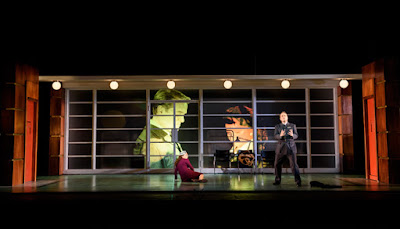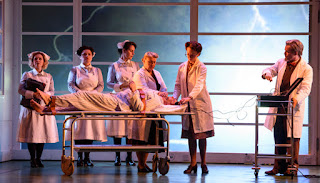 |
| Rebecca Evans, Lawrence Zazzo - Handel Orlando Welsh National Opera - photo Bill Cooper |
Reviewed by Robert Hugill on Oct 3 2015
Star rating:
Strong music values in 1940's setting for Handel's opera examining madness
As part of their Madness season, presenting three very contrasting music theatre treatments of madness (Handel's Orlando, Bellini's I Puritani and Sondheim's Sweeney Todd) Welsh National Opera (WNO) presented Handel's Orlando at the Wales Millennium Centre on Saturday 3 October 2015. Directed by Harry Fehr, designed by Yannis Thavoris, lighting by Anna Watson, video by Andrzej Goulding, movement Kelly Lloyd-Jones (also associate director), the production was originally created for Scottish Opera. The WNO performances featured Lawrence Zazzo as Orlando, Daniel Grice as Zoroastro, Fflur Wyn as Dorinda, Rebecca Evans as Angelica and Robin Blaze as Medoro. Rinaldo Alessandrini conducted the Welsh National Opera Orchestra.
 |
| Daniel Grice, Lawrence Zazzo (prone) - Handel Orlando Welsh National Opera - photo Bill Cooper |
When the curtain did go up for the first scene, Zoroastro's great scena as he looks at the stars, the setting was a 1940's hospital and instead of the stars, Zoroastro (Daniel Grice) was looking at the output from a device hooked up to Orlando's (Lawrence Zazzo) brain. Harry Fehr and Yannis Zavoris had transported the opera to the 1940's with Orlando and Medoro (Robin Blaze) as injured airmen. Dorinda (Fflur Wyn) was now a nurse with Angelica (Rebecca Evans) a glamorous socialite. There were some neat touches; when, in Act One, Zoroastro talks to Orlando of following the path of glory rather than love, he showed Orlando pictures of the Abdication and the subsequent aftermath with the Duke of Windsor being pictured with Nazis.
 |
| Robin Blaze, Fflur Wyn, Rebecca Evans - Handel Orlando Welsh National Opera - photo Bill Cooper |
Handel wrote Orlando in 1733 at a difficult period in the business of Italian opera in London. Orlando would be the last role which his star castrato created for Handel, as Senesino and a number of leading singers then defected to the rival Opera of the Nobility. Perhaps Senesino did not really appreciate the daring way Handel had written the role of Orlando, with his highly innovative mad scene where all the musical rules are broken. And to show of the talents of the great bass Montagnana, Handel and his librettist effectively created the role of Zoroastro adding moments like the opening scene to the existing libretto. Orlando was not a great success at its premiere, and Handel never revived the work again.
 |
| Lawrence Zazzo - Handel OrlandoWelsh National Opera - photo Bill Cooper |
The role of Medoro (Robin Blaze), written for a female singer, is one often still sung by mezzo-sopranos; the role's function is to provide love interest for Angelica (Rebecca Evans), so that their love annoys Orlando who fancies himself in love with Angelica. Robin Blaze fulfilled this function superbly, acting the role of the distinguished injured airman who feels himself unequal to the aristocratic Angelica. Handel peppers the opera with a series of love scenes for the two, and Blaze made a fine pairing with Evans as the two sang stylishly together, and created believable intensity of feeling.
 |
| Daniel Grice - Handel OrlandoWelsh National Opera - photo Bill Cooper |
Essentially the opera is about being in love with the wrong person. Before the action starts Dorinda loves Medoro and Orlando and Angelica are in love. The re-calibration, with Angelica and Medoro in love, leaves Orlando raving and Dorinda despondent. But Dorinda is something of a soubrette part, and Fflur Wyn combined a a lovely pertness of manner with her moping, and performed with bags of charm so that we felt sorry for her rather than annoyed. It helped of course, that Wyn as also a consummate master of Handel's style so that she sang with technical perfection too. By bringing a strong sense of character to Dorinda, Wyn ensured that the role did not simply become a series of chirruping arias.
 |
| Lawrence Zazzo, Rebecca Evans - Handel OrlandoWelsh National Opera - photo Bill Cooper |
Inevitably the opera was cut, but reasonably discreetly. Act 1 ran to 80 minutes, with Acts 2 and 3 each 40 minutes. Rinaldo Alessandrini kept speeds brisk, so we covered a lot of ground, and there were not waits for scene changes, so that the whole piece flowed well. And whilst speeds may have been fast-ish, there was never a sense of being driven and Alessandrini kept a lovely sense of flow with space for the singers. The orchestra kept up the promise given in the overture, and the arias and accompanied recitatives were all a series of stylish, vivid delights.
Yannis Thavoris' set, which was essentially a single piece set on a revolve, was elegantly imaginative and enabled the varied locations needed in the opera to flow without interrupting the music.
I have yet to see my idea production of Orlando but Harry Fehr's 1940's incarnation at least had the virtues of treating the story with seriousness, presenting the drama in his own way but treating it as serious drama and never guying it. Within this framework, Alessandrini, the singers and the orchestra created a series of very fine moments and ultimately, a rather moving drama.
This review also appears in OperaToday.com
Elsewhere on this blog:
- Hear the message: Bob Chilcott's The Angry Planet - CD review
- The lute song re-invented: Amores Pasados, from John Potter, Anna Maria Friman, Jacob Heringman and Ariel Abramovich - Cd review
- Through a romantic lens: Hideko Udagawa in baroque repertoire - Cd review
- Festival finale: King's College Choir & Stephen Cleobury in Mozart's Requiem at Hatfield House - concert review
- On Thrilling Form: English National Opera in Lady Macbeth of Mtsensek - opera review
- London International A Cappella Choir Competition: Heat 2 at St John's Smith Square - concert review
- New orchestra, new concert hall: I chat to Laurence Equilbey about Accentus, Insula and La Cité musicale départementale de l'Ile de Seguin - interview
- Red Note Ensemble: Entangled Fortunes, music of John McLeod - CD review
- Post-Freudian opera: Pierre Bartholomee's Oedipe sur la route - Cd review
- Celebrating 10 years: Stile Antico - Cd review
- Intimate and inward: Mahler songs from Anne Schwanewilms - CD review
- Remarkable engagement between artist and role: Juan Diego Florez in Gluck's Orphee et Eurydic - Opera review
- Building on the Schubert Project: My encounter with Oxford Lieder Festival founder Sholto Kynoch - interview
- Virtuoso drama: Pergolesi's Adriano in Siria from Opera Settecento - opera review
- Engaging discovery: Salieri's Trofonio's Cave from Bampton Classical Opera - opera review
- Lyric melancholy: Ian Venables Song of the Severn - CD review
- Home




.webp)

.jpg)




No comments:
Post a Comment